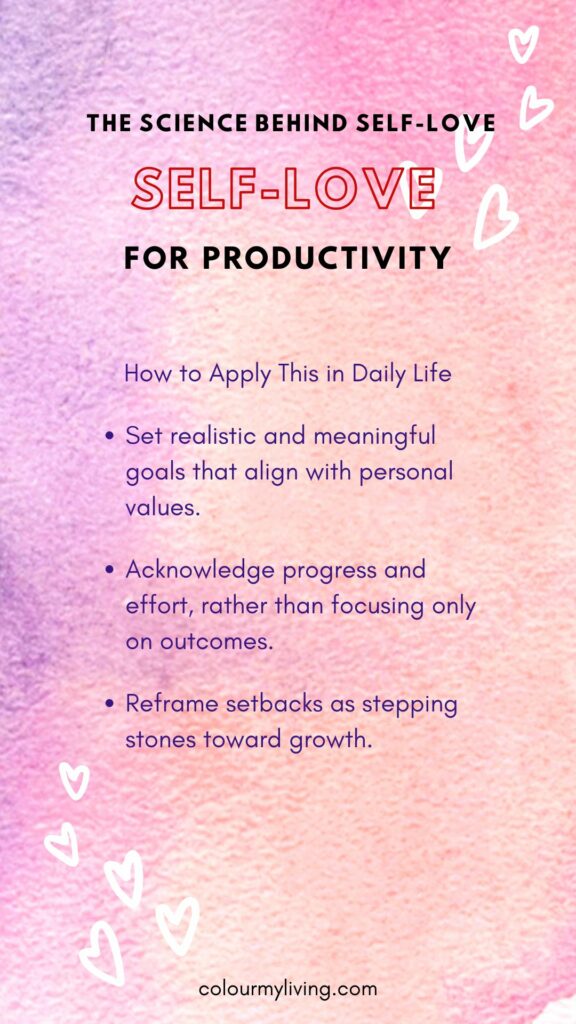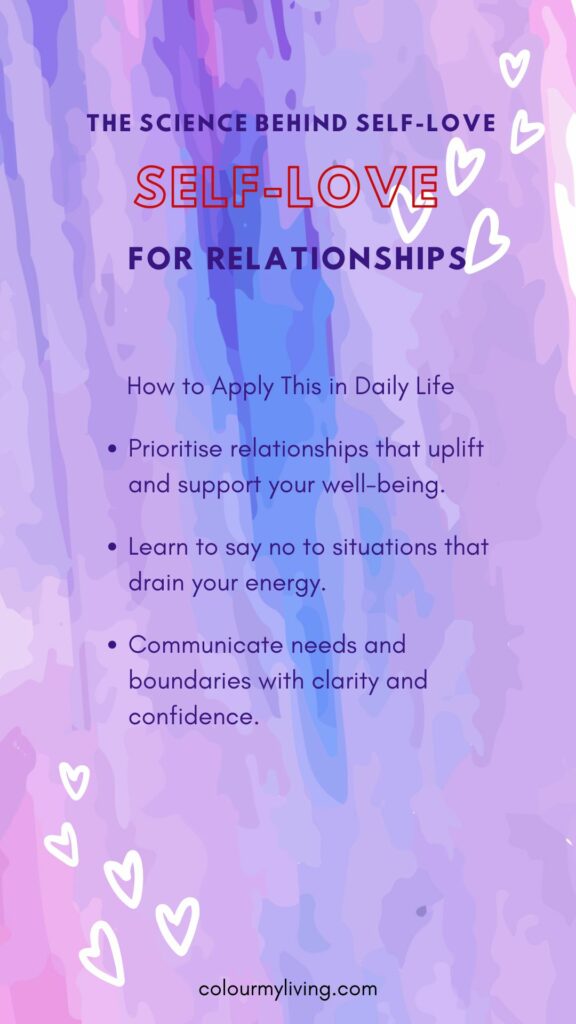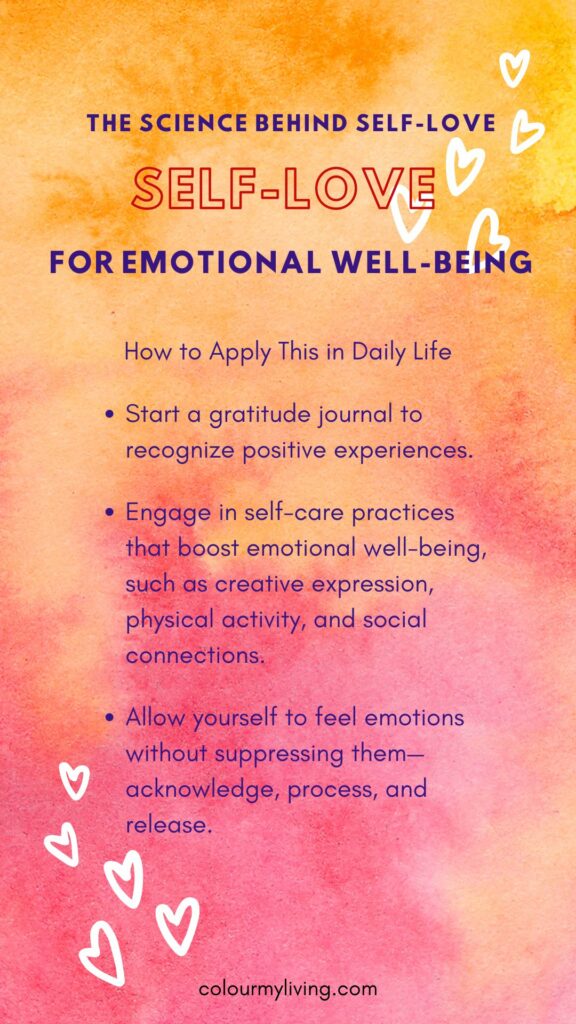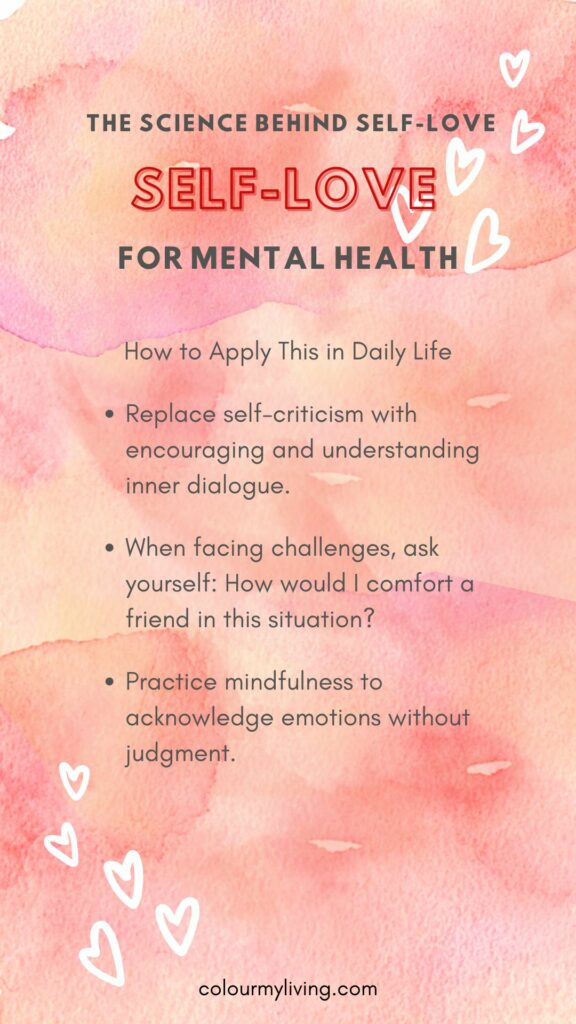Why Self-Love Matters
Self-love is often misunderstood as a superficial or indulgent concept, yet research consistently shows that it is a fundamental pillar of mental, emotional, and even physical well-being. The way we treat ourselves influences our thoughts, emotions, behaviors, and interactions with the world. It shapes our ability to handle stress, maintain meaningful relationships, and pursue personal and professional fulfillment.
For many, the idea of self-love may seem abstract or even unnecessary, especially in a world that often prioritises productivity, external validation, and meeting the expectations of others. However, research consistently shows that embracing self-love leads to profound benefits in mental, emotional, and even physical well-being.
Far from being indulgent, self-love is about developing a compassionate and supportive relationship with yourself. It involves making choices that promote well-being, resilience, and happiness. By incorporating self-love into daily life, you build upon the ability to navigate challenges with confidence, maintain strong relationships, and pursue personal and professional goals with clarity.
The following sections explore and examines the research on why self-love matters. It really is worthwhile taking a step back and giving time and grace to yourself. We have backed these points with research and have also curated some practical steps that will help you get started.
The Science Behind Self-Love
1. Mental Health: Reducing Anxiety, Depression, and Emotional Distress
Mental health plays a central role in shaping overall well-being, and self-love is one of the strongest predictors of psychological resilience. Studies show that individuals who practice self-compassion and positive self-talk experience lower levels of anxiety, depression, and emotional distress.
A study by Neff (2003) at the University of Texas found that self-compassion significantly reduces stress and promotes emotional stability. Individuals who treat themselves with understanding rather than harsh self-judgment recover more quickly from negative experiences and are less likely to engage in rumination or self-criticism, both of which contribute to mental health challenges.
Another study published in Clinical Psychology Review found that self-compassion-based interventions led to reductions in anxiety, depression, and emotional distress across multiple clinical trials (MacBeth & Gumley, 2012). The researchers concluded that individuals who practiced self-kindness rather than self-criticism experienced greater emotional resilience and long-term psychological well-being.
Similarly, psychologists Dr. Paul Gilbert and Dr. Christopher Germer who have developed and studied compassion-focused therapy (CFT), have found that self-compassion is a key element in emotional regulation and psychological well-being.
Rather than ignoring problems, self-compassion helps individuals acknowledge difficulties without self-judgment, fostering a sense of psychological safety. This makes it easier to navigate challenges without feeling overwhelmed, promoting greater emotional stability and personal growth.
How to Apply This in Daily Life:
- Replace self-criticism with encouraging and understanding inner dialogue.
- When facing challenges, ask yourself: How would I comfort a friend in this situation?
- Practice mindfulness to acknowledge emotions without judgment.
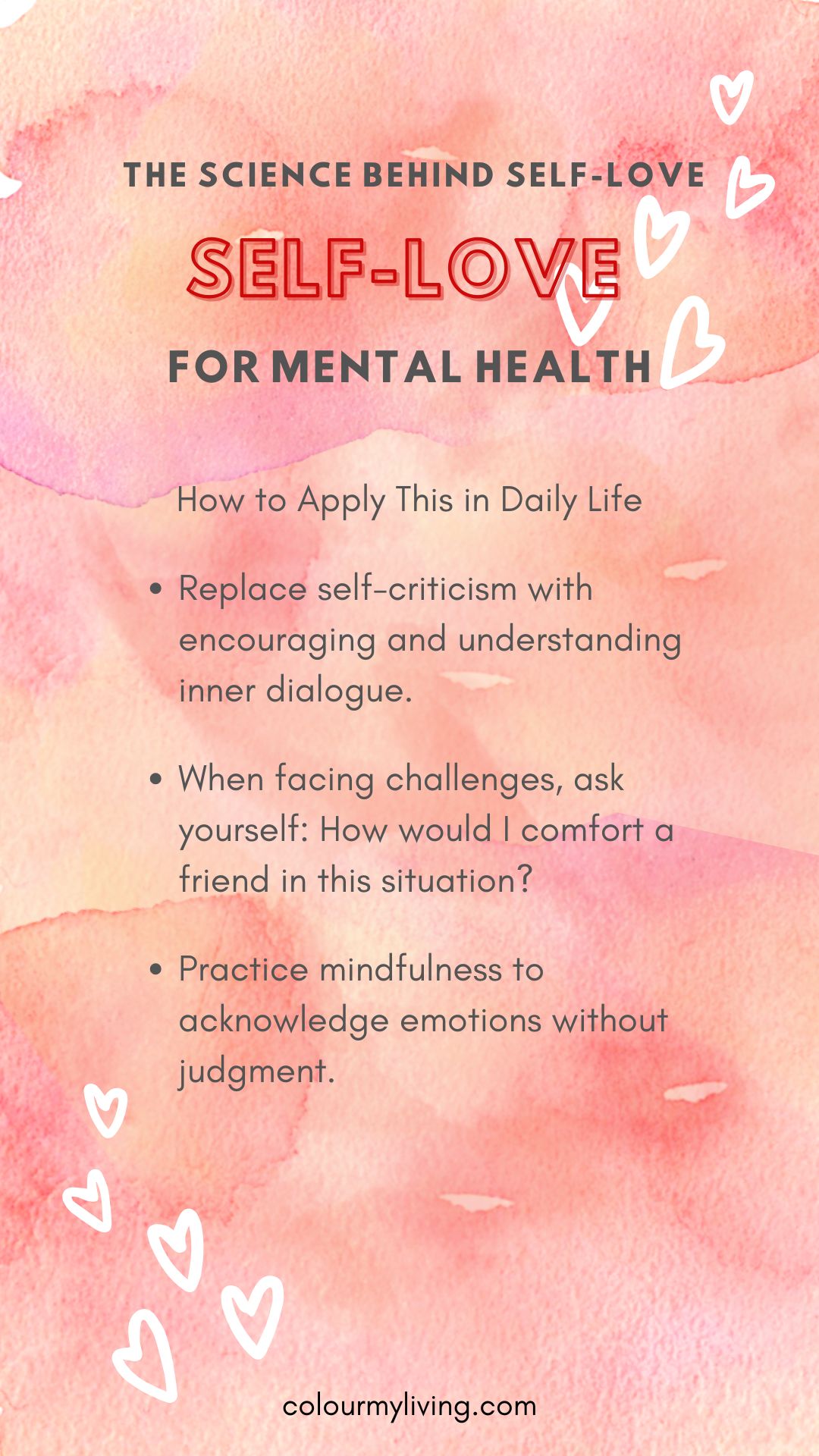
2. Emotional Well-Being: The Link Between Self-Acceptance and Happiness
Emotional well-being is connected to self-love, particularly in the way individuals interpret and respond to life’s challenges. Those who embrace self-love experience higher life satisfaction, improved emotional regulation, and greater overall happiness.
A study published in Health Psychology examined the effects of self-compassion on emotional well-being, finding that individuals who consistently practiced self-kindness reported lower levels of stress, a greater ability to cope with difficulties, and improved overall happiness (Zessin, Dickhäuser & Garbade, 2015).
Further research in positive psychology highlights the connection between self-acceptance and well-being. The researchers found that those who acknowledged and accepted their strengths and weaknesses felt more at peace with themselves and were less likely to experience emotional distress. (D L MacInnes 2006)
By developing self-love, individuals build emotional resilience, allowing them to navigate life’s ups and downs without being consumed by self-doubt or negative emotions.
How to Apply This in Daily Life:
- Start a gratitude journal to recognize positive experiences.
- Engage in self-care practices that boost emotional well-being, such as creative expression, physical activity, and social connections.
- Allow yourself to feel emotions without suppressing them—acknowledge, process, and release.
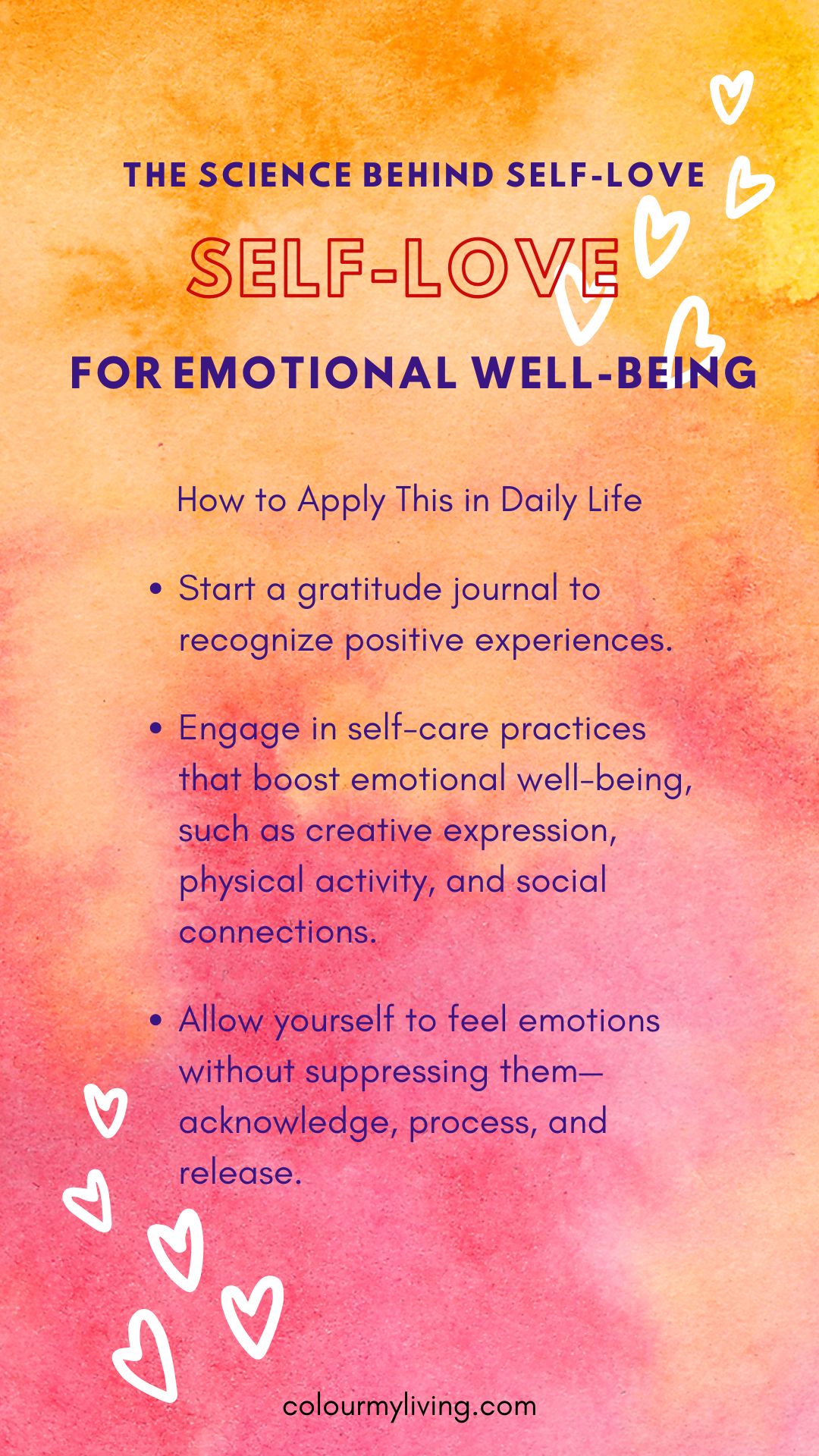
3. Relationships: Strengthening Bonds Through Self-Worth
The way individuals treat themselves directly impacts the quality of their relationships. When people cultivate self-respect, confidence, and emotional independence, they engage in relationships that are healthier, more balanced, and fulfilling.
Research published in the Journal of Personality and Social Psychology found that individuals with higher levels of self-compassion and self-love were better at establishing strong personal boundaries, attracting supportive relationships, and feeling secure in romantic partnerships (Barnes, Brown, Krusemark, Campbell & Rogge, 2007).
Self-love reduces the tendency to seek validation from others, fostering a greater sense of self-reliance and emotional security. When individuals recognize their own worth, they are more likely to:
- Communicate their needs effectively.
- Set and maintain healthy boundaries.
- Engage in relationships based on mutual respect rather than dependence.
A separate study by Neff & Beretvas (2013) found that self-compassionate individuals had more satisfying and harmonious romantic relationships. Their partners described them as more understanding, emotionally available, and less reactive during conflicts. By embracing self-love, individuals foster stronger, more fulfilling connections that are built on respect, trust, and emotional reciprocity.
How to Apply This in Daily Life:
- Prioritise relationships that uplift and support your well-being.
- Learn to say no to situations that drain your energy.
- Communicate needs and boundaries with clarity and confidence.
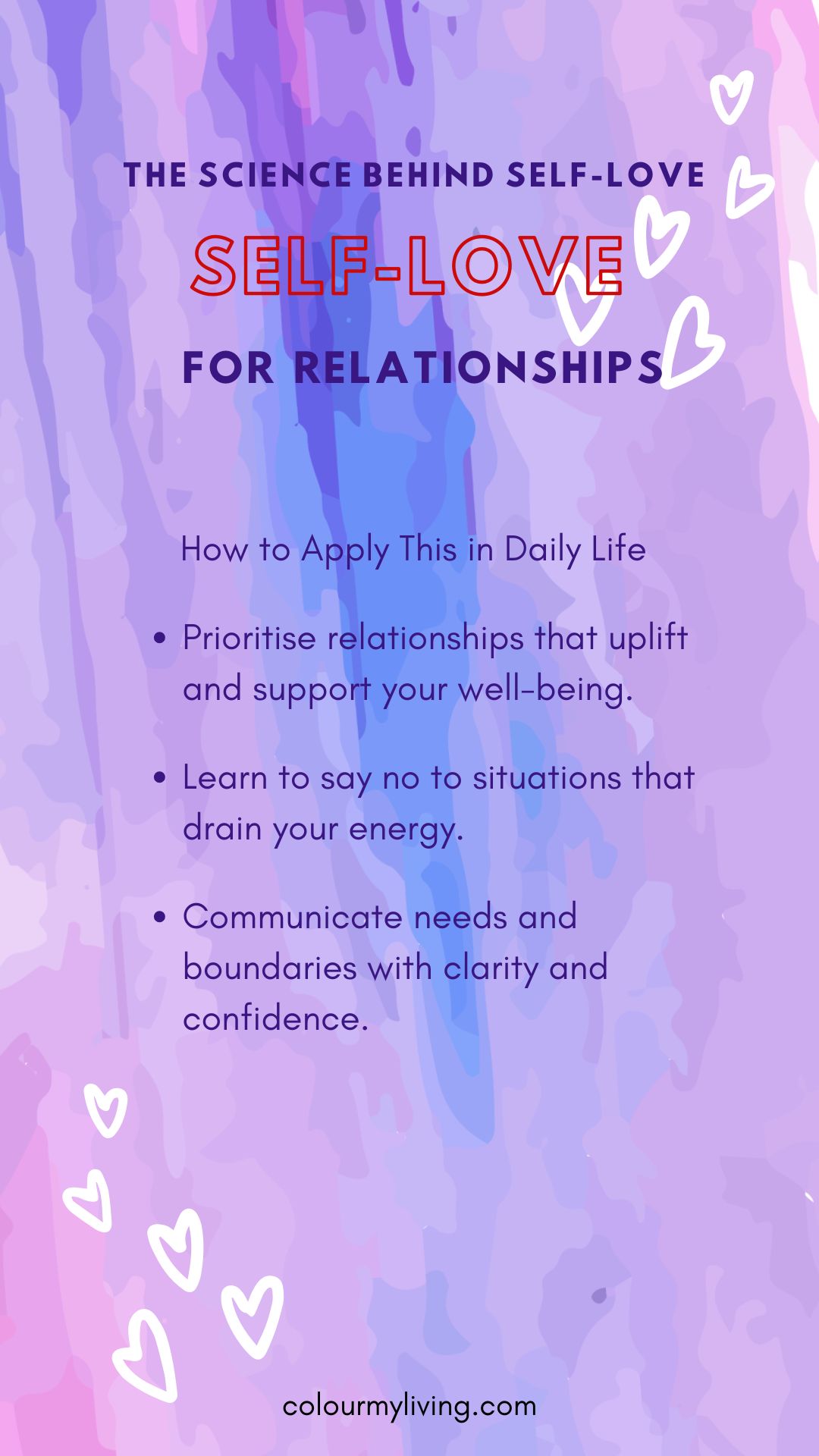
4. Productivity: The Role of Self-Compassion in Motivation
Contrary to the belief that self-criticism is necessary for success, research shows that self-love enhances motivation, perseverance, and productivity. When individuals approach themselves with kindness rather than self-judgment, they are more likely to persist through challenges and maintain long-term motivation.
A study conducted at Stanford University found that individuals who practiced self-compassion were more resilient in the face of setbacks, more motivated to achieve their goals, and less afraid of failure (Breines & Chen, 2012). Rather than becoming discouraged by difficulties, self-compassionate individuals saw challenges as opportunities for learning and growth.
The concept of a growth mindset, introduced by psychologist Dr. Carol Dweck, also aligns with self-love principles. Her research suggests that those who embrace challenges with self-compassion and perseverance are more likely to develop adaptive problem-solving skills and long-term success (Dweck, 2006).
By moving away from self-criticism and toward self-encouragement, individuals create a sustainable balance between ambition and well-being, leading to greater productivity and long-term fulfillment.
How to Apply This in Daily Life:
- Set realistic and meaningful goals that align with personal values.
- Acknowledge progress and effort, rather than focusing only on outcomes.
- Reframe setbacks as stepping stones toward growth.
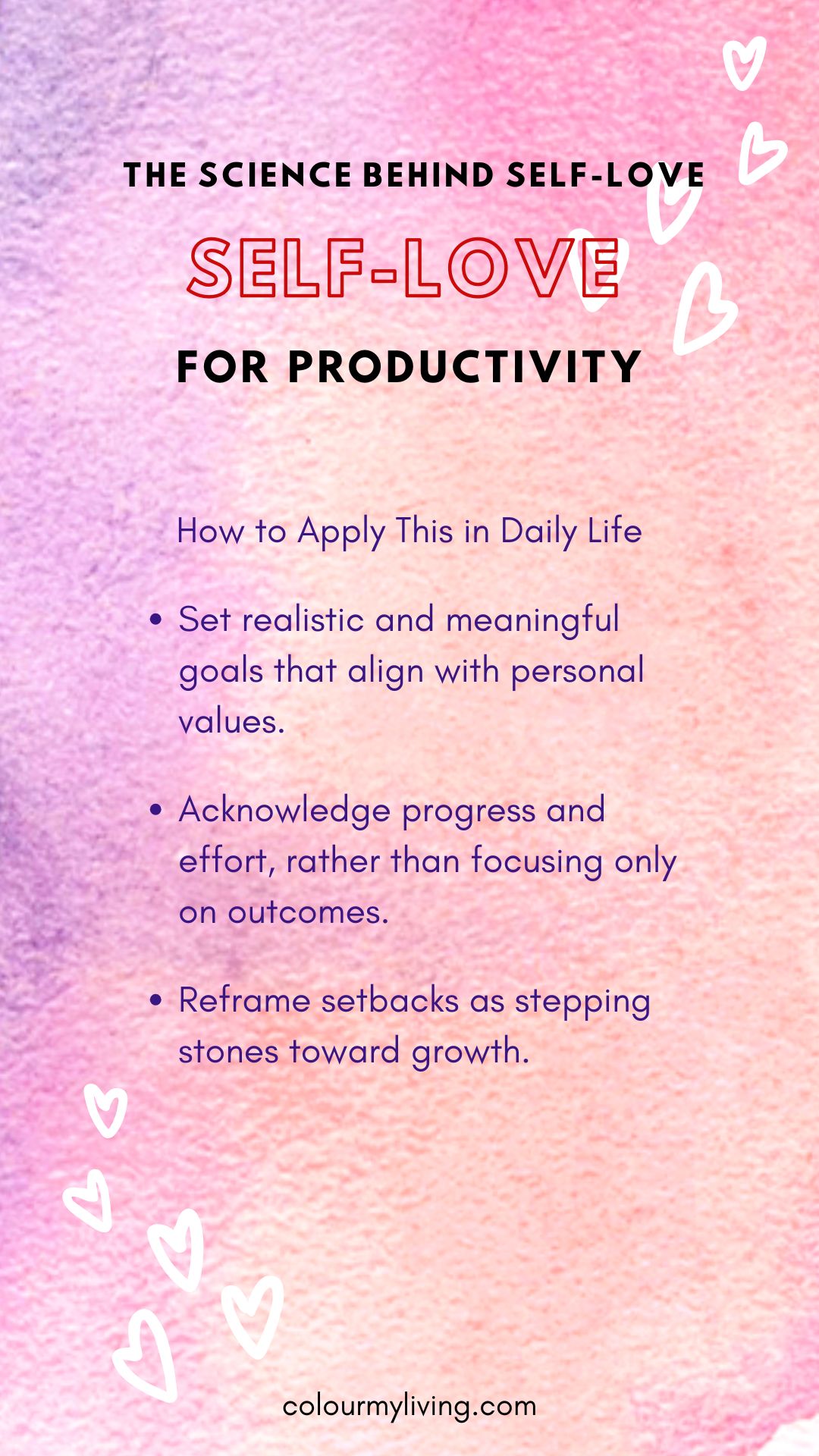
Integrating Self-Love into Daily Life
Self-love is not meant to be a final destination but an ongoing practice that will require intention, consistency, and self-awareness. It can be nurtured through small yet meaningful actions that reinforce emotional resilience and self-worth.
Some ways to incorporate self-love into daily life include:
- Practicing self-compassion in challenging moments, offering the same kindness to oneself as would be given to a friend.
- Engaging in self-care rituals that restore energy and enhance well-being.
- Surrounding oneself with positive influences, fostering relationships that uplift and support growth.
- Celebrating progress, recognizing that growth is a continuous process rather than a fixed outcome.
Developing self-love changes the way individuals experience themselves, their relationships, and their ambitions. It is the foundation for emotional, mental, and physical well-being, allowing individuals to lead more authentic, fulfilling, and purpose-driven lives.
Read on to:
- Learn how to Stop holding yourself back: Overcome Barriers to Self-love
- Learn how Daily habits can build emotional strength and inner growth
References
- Self-Compassion: An Alternative Conceptualization of a HealthyAttitudeToward Oneself. Kristin Neff. 2003 Psychology Press. DOI: 10.1080/15298860390129863
- Exploring compassion: a meta-analysis of the association between self-compassion and psychopathology. Angus MacBeth, Andrew Gumley. Aug 2012. Clinical Psychology Review DOI: 10.1016/j.cpr.2012.06.003
- The origins and nature of compassion focused therapy. Paul Gilbert. 2014 British Journal of Clinical Psychology DOI: 10.1111/bjc.12043
- The Relationship Between Self-Compassion and Well-Being: A Meta-Analysis Ulli Zessin, Oliver Dickhäuser, Sven Garbade. 26 August 2015 Applied Psychology https://doi.org/10.1111/aphw.12051
Self-esteem and self-acceptance: an examination into their relationship and their effect on psychological health D L MacInnes 2006 J Psychiatr Ment Health Nurs. 2006 Oct;13(5):483-9. doi: 10.1111/j.1365-2850.2006.00959.x. - Barnes S, Brown KW, Krusemark E, Campbell WK, Rogge RD. The role of mindfulness in romantic relationship satisfaction and responses to relationship stress. J Marital Fam Ther. 2007 Oct;33(4):482-500. doi: 10.1111/j.1752-0606.2007.00033.x. PMID: 17935531.
- Neff, K. D., & Beretvas, S. N. (2012). The Role of Self-compassion in Romantic Relationships. Self and Identity, 12(1), 78–98. https://doi.org/10.1080/15298868.2011.639548
- Breines, J. G., & Chen, S. (2012). Self-compassion increases self-improvement motivation. Personality and Social Psychology Bulletin, 38(9), 1133–1143. https://doi.org/10.1177/0146167212445599
